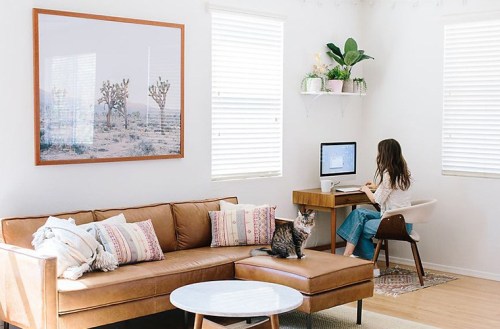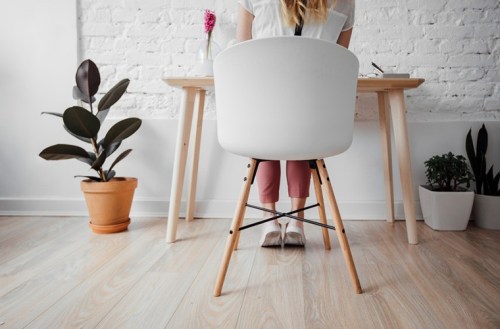Our editors independently select these products. Making a purchase through our links may earn Well+Good a commission
Is the air quality in your home giving you acne?
Get your clearest skin ever with a few household hacks—like making the switch to non-toxic cleaning products and dusting (the right way).

Many causes of acne are no-brainers, like touching your face too much or not washing it after a workout. Others, like stress breakouts or hormonal pimples, are a tad more elusive. Then there’s this: Something in the air could actually be behind your flare-ups without you even realizing it.
“Your skin is constantly in contact with the air around you, and many people don’t realize that you can have reactions from it,” says Ronald Ro, the founder of Awair, a company that creates air quality monitors. “Unhealthy air has the potential to trigger eczema flare-ups, hives, acne breakouts, and premature aging.”
The air indoors can be up to five times more polluted than outdoors.
It’s problematic, explains Ro, because the air indoors can be up to five times more polluted than outdoors. “It’s easy to assume the air around you is safe and healthy if you can’t directly sense anything wrong with it, like smoke or odors,” he explains. “But this isn’t always the case.”
Thankfully, there are plenty of simple precautions you can take to ensure you’re surrounding yourself with clean air in your own home.
Keep reading to see what might floating around in the air—and how to prevent them from affecting your skin.

The sources of acne-causing air
Even if you Marie Kondo your space like a pro and keep candles (or your diffuser) going, your hygge home might still be sabotaging your complexion.
“Whether the air around you is unhealthy depends on five factors that affect air quality,” Ro explains. “These are the levels of chemicals, dust, carbon dioxide, temperature, and humidity. Too much or too little of these can irritate your skin and lead to breakouts.”
This Parisian Skincare Brand Is Launching in the United States for the First Time—Here’s What a Derm Wants You to Know

We’re Calling It: Cleansing Balms Are the Face Wash of the Future—Here Are 3 to Add to Your Cart

This Is the One Product That Scarlett Johansson Always Keeps in Her Purse and on Her Bedside Table

Inside, toxins that affect your skin can purportedly drift into the air from seemingly innocuous places like the walls. “Unhealthy skin can be caused by the level of chemicals in your air,” Ro says. “These are commonly known as volatile organic compounds, or VOCs.” Frequently, these tiny, invisible particles lurk in things like paint, cleaning products, candles, and air fresheners—and they can have all sorts of repercussions for your skin.
“Unhealthy skin can be caused by the level of chemicals in your air.”
“VOCs have been shown to disrupt the skin barrier, promote inflammation, and lead to free radical damage,” says Joshua Zeichner, MD, a New York City-based dermatologist. And both free radical damage and inflammation have the potential to cause acne flare-ups.
Persistent organic pollutants, or POPs, might also be at fault, according to Caroline Blazovsky, the expert behind My Healthy Home. “POPs are semi-volatile organic chemicals that linger for longer durations,” she says. “These adhere mostly to surfaces, and can be things like flame retardants and pesticides.” The problem, she explains, is that they’ve been linked to disrupting the endocrine system and of interfering with hormone regulation (hence the risk of chin breakouts).
As if that’s all not enough, Dr. Zeichner notes that some dust particles can also affect your complexion. “Particle matter are microscopic dirt particles suspended in the air that can come from a variety of industrial sources,” he explains. “It’s most commonly from automobile exhaust, but it’s been shown to be associated with skin aging and the development of hyperpigmentation.”

So, what to do?
“It’s best to start by understanding what’s in the air around you,” notes Ro. Once you have a grasp on your existing air quality, you can make the small tweaks that will give you fresher air.
“Opt for VOC-free disinfectants, non-toxic paint and top coats, and open your windows as often as you can to let in the clean breeze,” Ro says. Also, you can shop for cleaner, safer cleaning products (or make your own)—the Environmental Working Group (EWG) has a helpful guide to help you know what to watch out for.
As for dust, Ro advises using a damp cloth to get rid of it instead of dry dusters. “Those usually spread dust into the air instead of trapping it,” he explains. Other methods include using an air purifier or adding a snake plant, which Ro notes can help absorb chemicals in the air.
With your skin itself, Dr. Zeichner stresses the importance of washing your face—especially in the evening. “Dirt, oil, and pollution accumulate during the day, so washing it at night removes these compounds,” he says. “This minimizes the risk of skin inflammation.” To guard against free radical damage, try mixing an antioxidant-packed booster such as True Botanicals Antioxidant Booster ($90) into your skin-care product of choice.
With a little easy home improvement, there’s one less thing keeping you from your glowiest, healthiest self.
While you’re at it, here are the 4 brilliant Ikea pieces you need for your healthy home. And here’s your guide to shopping for indoor plants to spruce up your place.







